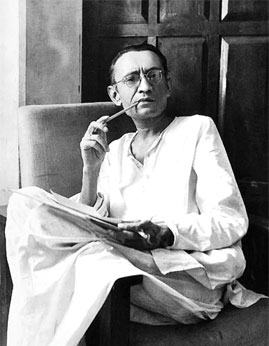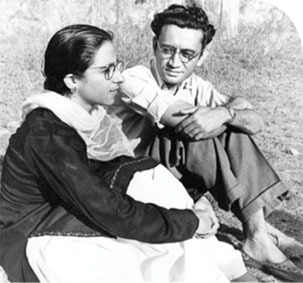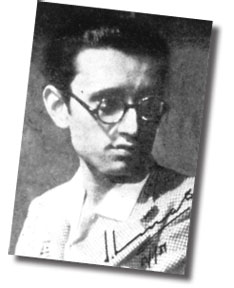|
Remembering Manto:
Master of Urdu Literature and Pakistan's D.H Lawrence
By Rushda RAFEEK
 If you find my stories dirty, the society you are living in is dirty.
With my stories, I only expose the truth." For anyone who finds Saadat
Hasan Manto's comment outrageous in absolute fashion, then he is not for
you. His words might seem liquorish to taste- like what his mouth begged
for perhaps, he who penned his own epitaph: "Here lies Saadat Hasan
Manto. With him lie buried all the arts and mysteries of short story
writing. If you find my stories dirty, the society you are living in is dirty.
With my stories, I only expose the truth." For anyone who finds Saadat
Hasan Manto's comment outrageous in absolute fashion, then he is not for
you. His words might seem liquorish to taste- like what his mouth begged
for perhaps, he who penned his own epitaph: "Here lies Saadat Hasan
Manto. With him lie buried all the arts and mysteries of short story
writing.
Under tons of earth he lies, still wondering who of the two is the
greater short story writer: God or he." Drawing a question mark with
knitted eyebrows, of course, the plot hovers in a thick cloud as to why
the attention suffers a minimum to Manto following his stellar
contribution serving as a tool of human aspect amid the deft fingered
literature in a language linking only by tongue and not by hearts of its
people, that is, Urdu.
Historian
For even when the veteran film critic and historian Rafique Baghdadi
asks the residents of Byculla in Mumbai today, they question back in the
need to know who Manto is- oblivious to what Manto had, within a short
spell, given the twelve of his later years to film writing for the then
Bombay Talkies and Filmistan.
With so much to hold close to the bosom common to care, this year
commemorated his 100th birth anniversary on May 11. But in contrast how
many of us like the Byculla residents know Manto as one of the most
prolific South Asian literary figures not forgetting his insightful
legacy trailing behind him- once threatened to be cut off?
Toba Tek Singh, a fine example of his ilk, leaps from the page at the
reader with a whiff of his irascibility at play no sooner you start
reading in that moment. Throwing together bravado, less of insensitivity
but what he termed was an undertone of irony to the air, he conveyed, in
every sense, immorality is exactly what a conflict can cause whose
incense was ache, a smoke of shame faintly dropping to mere ash, what
then, had to be cleaned up.
Unbiased stand
Unbiased to stand against what he thought was, in existence and to
march among the profane and be plucked out from the endemic corruption,
Manto reflected concerns for the Partition of the subcontinent in 1947
by the British; taking a bold leap as does
the word literature, most of all, demanding a writer take inventory
beyond sounding precious.
As the years wore on, Manto stumbled upon and between questions
pecking on the quintessence of identifying him, and to whom he now
belongs within the startling dislocation bespattered by the birth of
Pakistan in India's Partition. He was deeply affected and through this
painful daily advance, anointed by the devil in his people, which tore
the rhythm and struck a chord that never will a world be reasonable or
just again.
 Toba Tek Singh reveals it all: "One inmate had got so badly caught up
in this India-Pakistan-Pakistan-India rigmarole that one day, while
sweeping the floor, he dropped everything, climbed the nearest tree and
installed himself on a branch, from which vantage point he spoke for two
hours on the delicate problem of India and Pakistan. The guards asked
him to get down; instead he went to a branch higher, and when threatened
with punishment, declared, 'I wish to live neither in India nor in
Pakistan. I wish to live in this tree.'" Toba Tek Singh reveals it all: "One inmate had got so badly caught up
in this India-Pakistan-Pakistan-India rigmarole that one day, while
sweeping the floor, he dropped everything, climbed the nearest tree and
installed himself on a branch, from which vantage point he spoke for two
hours on the delicate problem of India and Pakistan. The guards asked
him to get down; instead he went to a branch higher, and when threatened
with punishment, declared, 'I wish to live neither in India nor in
Pakistan. I wish to live in this tree.'"
Reconciliation
What Manto represented, then, was the urging request for
reconciliation of the divided two. The question becomes, if we develop a
stream of fondling or fury upon reading his bare stripped sensory
details and what we can do with this shameless soul? And here is where
things get threatened as Shakespeare's Feste may reveal a truth, as
jests can do in a harsh world. There was still within Manto an element
analysing of the folly of those around him and what was beneath the
decorous yet pretended friendship of an order conscious discriminating
system.
We hear him drum the loss of heartbeat as one nation by its way of
'ethnic cleansing' through his portrayal of these tragedies by
cultivating an elegance of delight, and mastery at once everything
indeed, with each of them fine and new almost always revealing itself
when we come back. To return to that of anything by Manto is something
vibrant and fresh as rising, but also never really setting. It stays
like an uncleared blood of evidence.
Uncle Sam
In Letters to Uncle Sam that takes form by putting terrible creases
into the garment of American policy with nine letters written in Urdu
between 1951 and 1954, clearly, the lour lipped culprits are brought
forward. Arguing rational matters and giving it square to the face, then
interposes often, in full force, a tight tension of slap stick comedy,
with a psychoanalytic theory- conceptualising two different worlds in
contrast- that of what is enjoyed by the Western American splashed in
the media available and the communists in Pakistan.
His thoughts on the movie 'Bathing Beauty' from the second letter
comes forth: "Uncle, is this how women's legs look like in your country?
If so, then for God's sake (that is, if you believe in God) block their
exhibition in Pakistan at least."
The migration from Bombay to Lahore in January 1948 sadly did not
work in his favour. What was to follow were several chapters of
unsettlement for Manto. He remained desperate to make ends meet for his
family in 'Laxmi Mansions' in Hall Road, only cutting deep the regret in
his collection 'Yazid' he mourns: "My heart is heavy with grief today.
I feel enveloped by a strange listlessness. More than four years ago
when I said farewell to my other home, Bombay, I experienced the same
kind of sadness. I was sorry to have left the place where I had spent
many working days of my life.
 Bombay had asked me no questions. It had taken me to its generous
bosom, me, a man rejected by his family, a gypsy by temperament. And the
city had said to me: 'You can live here happily on two paisa a day, or
if you wish, on ten thousand rupees. It is up to you...'." Bombay had asked me no questions. It had taken me to its generous
bosom, me, a man rejected by his family, a gypsy by temperament. And the
city had said to me: 'You can live here happily on two paisa a day, or
if you wish, on ten thousand rupees. It is up to you...'."
Jovial characters
To add, thumping jovial characters into the dough of his short
fiction, Manto's ability to utilise them and mirror a snapshot of the
savagery and human behaviour bespoke none other than, simply, the
present situation those days.
In opening up thought tied to a real-world driven thrust in the works
of Manto for his pimps, swindlers, drunkards, thieves, thick bearded
Sikhs, child prostitutes, degraded women of the patriarchy, half baked
mullahs, murderers, cheating spouses, desperate fathers, liars and
gamblers to help draw pathos in the cold light of uncouth public, brings
my toes to dip into places one sojourns in the hope of what may hold and
move us through the clever in the callow.
A great deal of this is enjoyed in Ten Rupees so seldom heard as if
hit by hard a breeze, absorbing the senses beyond the mere reading of
words than, a distinct yet disturbing view invites us in say, Thanda
Gosht (Cold Flesh), Mozelle, and Khol Do.
Diction
Manto dusted off topics left untouched and if nothing else, that
wanted to be written following the breakthrough of the Partition both
ironically and problematically watered by blunt diction and the lyrical
hem in regard of style.
As he kept observing the matter yet disagreeing with a mind of his
own in a time capable of watching from an extremist's distance, if not,
with an open mouth in horror behind a covering hand.
There were moments of restrictions and moments of political pollution
acting as a fillip. Finding this useful, in the mould of D.H Lawrence,
Manto fought those shores gnawed by human hypocrisy, with it came a
string of rapes on an unwinding spool and mayhem squirting communal
violence and atrocities then rushes into a sunken poignancy washing the
face of exposure away like a footprint when deception makes a fine
camouflage jacket.
Manto was tried for obscenity many times more than a dozen, and yet
never convicted, all because his work learnt the lyrics of those ghazals
no one dances to and be deemed impermissible for society although much
to the amusement ,were sworn to tell the truth, the whole truth and
nothing but the truth, the only honest answer.
Revelation
It is terrifying a revelation; Manto failed his matriculation exam in
Urdu and dropped out of Hindu Sabha College in Amritsar having failed
twice whilst still a freshman. But then how does one pick up the pen and
battle oppressive diseases looming large? It is, soon after meeting,
Abdul Bari Alig, a journalist, scholar and writer, he embraced the
thirst for reading works of the literary heavyweights namely- Chekhov,
Pushkin, Oscar Wilde, Gorky, Victor Hugo, Maupassant and many who
ultimately provided the champions of influence. Manto published
twenty-two collections of stories, three collections of essays with
seven collections of radio plays, some film scripts, letters and a novel
to his name, juggling controversy and criticism stinging as sad an
attempt throughout the spread of a two-decade career.
Tucked in the pockets of literature and that what can be said like
everything else turning sore overnight, Manto remains a forgotten napkin
but daring to remind not something of a gull trap perhaps, what drew a
resisting decay so becomes difficult to remove. People just a few like
Manto with not many years in hand, who toiled to speak for the hopeless
languishing in their chains, let alone expounds the abusive silence we
bring to ourselves and others are less recognised.
Perhaps even more telling, this, when we, with our insincerity in the
cast of mind, accept the devils in ourselves but not an attempt or
thought is cobbled for Manto's, that too not his own but in his written
word as we know it. There again, lies in the human forever separate.
Mesmeric essay
Untimely, journeys begin with the end in mind; like salt which ate
through the grill guarding the windows of actor Ashok Kumar's seafront
house in Manto's mesmeric essay Stars from Another Sky: The Bombay Film
World of the 1940s, inebriety corroded his liver causing cirrhosis to
creep into its walls.
Manto breathed his last in 1955 before his 43rd birthday, although
life for him entailed, only and always, to shake the realism out of
impulsive predicaments- tossing its revolutionary head in the pre and
post colonial subcontinent where this was least considered a right.
But then there is always Camus who you go to listen, who said: "The
pur-pose of a writer is to keep civilisation from destroy-ing itself."
Yet most frankly, in fact, standing by himself, between the
divisional destruction to help maintain the goodness in its absence
where too, the crescent of Manto's love for humanity left unnoticed in
the sherwani of his prose, in some of us, retains the honey in the curd. |

